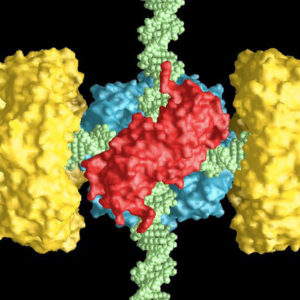Proteomics Bioinformatics (Virtual)
12–16 July 2021
Virtual Course
Hands-on training in the basics of mass spectrometry, proteomics bioinformatics, and related methods and resources
Summary
PLEASE NOTE: Due to the ongoing Covid-19 pandemic this course will be held virtually.
Run jointly with EMBL-EBI, this popular course provides hands-on training in the basics of mass spectrometry (MS) and proteomics bioinformatics approaches, search engines and post-processing software, quantitative proteomics approaches and related statistical concepts, MS proteomics data repositories and public data re-use, how to employ existing databases for protein analysis, perform the annotation of subsequent protein lists and the incorporation of information from molecular interaction and pathway databases.
Virtual Course
Participants will learn via a mix of pre-recorded lectures, live presentations, and trainer Q&A sessions. Practical experience will be developed through group activities and trainer-led computational exercises. Live sessions will be delivered using Zoom with additional support and communication via Slack.
Pre-recorded material will be made available to registered participants prior to the start of the course and in the week before the course, there will be a brief induction session. Computational practicals will run on EMBL-EBI’s virtual training infrastructure, meaning participants will not require access to a powerful computer or install complex software on their own machines.
Participants will need to be available between the hours of 09:00-17:30 GMT each day of the course. Trainers will be available to assist, answer questions, and further explain the analysis during these times.
Who is this course for?
The course is aimed at research scientists with a minimum of a degree in a biological discipline, including laboratory and clinical staff, as well as specialists in related fields. The practical elements of the course will take raw data from a proteomics experiment and analyse it. Participants will be able to go from MS spectra to identifying and quantify peptides and finally to obtain lists of protein identifiers that can be analysed further using a wide range of resources. The final aim is to provide attendees with the practical bioinformatics knowledge they need to go back to the lab and process their own data when collected.
Programme
The programme will include lecture and practical, computational sessions covering the following topics:
- Mass Spectrometry Basics
- Proteomics Bioinformatics Basics
- Quantitative proteomics
- Introduction to data independent acquisition approaches
- Standardisation of proteomics data
- MS proteomics repositories, including PRIDE and PRIDE-related tools and ProteomeXchange
- Introduction to Proteogenomics
- Protein interaction data through IntAct and IMEX resources
- Functional analysis of proteins using Cytoscape and Reactome
Learning Outcomes
After completing the course, participants will be able to:
- Use and understand bioinformatics tools to analyse shotgun proteomics data, involving identification and quantification approaches
- Evaluate the strengths and weaknesses of several experimental and bioinformatics analysis approaches
- Browse, search, submit, retrieve and re-use proteomics data from widely used public proteomics data repositories
- Use tools to perform functional annotation of lists of proteins
Instructors and speakers
Scientific Organising Committee

Juan A. Vizcaíno
EMBL-EBI, UK

Lennart Martens
Ghent University and VIB, Belgium
The course will be taught by trainers from EMBL-EBI.
Guest speakers

Evangelia Petsalaki
EMBL-EBI, UK

Theo Roumeliotis
The Institute of Cancer Research, UK
How to apply
Prerequisites
Applicants should be research scientists with a minimum of a degree in a biological discipline, including laboratory and clinical staff, as well as specialists in related fields.
How to Apply
Please click the Apply button above to begin the online application process. Places are limited and will be awarded on merit. If you have any problems with the online application process, please contact us.
Please note: Applications must be supported by a recommendation from a scientific or clinical sponsor (e.g. supervisor, line manager or head of department). A request for a supporting statement will be sent to your nominated sponsor automatically during the application process. Applicants must ensure that their sponsor provides this supporting statement by the application deadline. Applications without a supporting statement cannot be considered.
Cost
| Cost | ||
| *Course fee | £200 | Due to the ongoing Covid-19 pandemic we are exploring options to deliver this course in a virtual format. |
*The course fee is subsidised by Wellcome Genome Campus Advanced Courses and Scientific Conferences and applies to non-commercial applicants. Please contact us for the commercial fee.
Bursaries
Limited bursaries are available (up to 50% reduction on the course fee) and are awarded on merit. If you would like to apply for a bursary, please complete the bursary section of the online application form.
Where there are many bursary applications, the selection committee may issue smaller amounts.
Bursaries can be applied for as part of the course application form. Applicants will be notified of a bursary award along with their place on the course, usually within one month of the application deadline. The decision of the selection committee is final.
Please note that both the applicant and sponsor are required to provide a justification for the bursary as part of the application.
Additional funding opportunities
Visit our support page for additional financial support currently available.
Accommodation services phishing scam – please be vigilant. More information.

